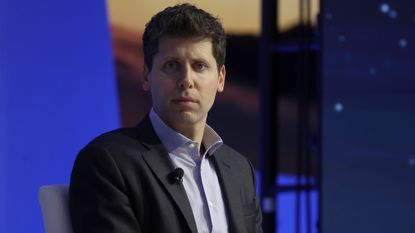OpenAI: A boardroom coup wrenches the AI world
OpenAI employees are asking the board to resign

The smartest insight and analysis, from all perspectives, rounded up from around the web:
Sam Altman walked onstage at OpenAI’s first developer conference on Nov. 6 to rapturous applause as he "ticked off the company’s accomplishments," said Max Chafkin and Rachel Metz in Bloomberg. Last week, the co-founder and chief executive of the world’s most famous artificial intelligence company was fired by its board via teleconference. The abrupt dismissal less than two weeks after Altman’s thunderous ovation triggered a chaotic weekend of jockeying over the future of the company that brought ChatGPT to the world and set off an international AI frenzy. More than 730 of OpenAI’s 770 employees signed a letter saying they would quit if the board didn’t resign. Microsoft, which owns a 49% stake, promptly said it would hire Altman to "lead a new in-house AI lab alongside OpenAI board member Greg Brockman." Meanwhile, OpenAI’s board clung to its original goal as a nonprofit founded to "advance digital intelligence" to "benefit humanity as a whole." Under Altman, that mission was spinning "out of control," becoming "maybe even dangerous."
To understand the chaos you have to know that OpenAI isn’t structured like a normal company, said Rohan Goswami at CNBC. At the top is its board, the "group responsible for pushing Altman out," which controls a nonprofit corporation, OpenAI Inc. That nonprofit owns and controls a subsidiary, OpenAI Global, which is the company that Microsoft invested in. The for-profit subsidiary was created so that OpenAI could lure enough talent to keep up with Big Tech rivals. But "none of its largest backers, even Microsoft, have board seats." Microsoft has something else, though, said Ben Thompson in Stratechery: "a perpetual license to all OpenAI intellectual property, including source code." The question was always whether "it had the talent to exploit that IP." You can make the case that by hiring Altman and Brockman Microsoft can "acquire OpenAI for $0 and zero risk of an antitrust lawsuit."
Subscribe to The Week
Escape your echo chamber. Get the facts behind the news, plus analysis from multiple perspectives.

Sign up for The Week's Free Newsletters
From our morning news briefing to a weekly Good News Newsletter, get the best of The Week delivered directly to your inbox.
From our morning news briefing to a weekly Good News Newsletter, get the best of The Week delivered directly to your inbox.
This isn’t Altman’s first ugly corporate breakup, said Eric Newcomer in his Substack newsletter. His departure as president of the startup accelerator Y Combinator "was more contentious than publicly understood," echoing some of what’s going on here. Two of OpenAI’s former executives quit to form a safer AI company, Anthropic, because they "felt troubled enough" by Altman’s approach. This fiasco is exactly why AI demands regulation, said Steve Petersen in the New York Post. The technology carries too much potential danger for corporations to police themselves. "Investor greed should not be a thumb on this particular scale."
OpenAI tried and failed to straddle a rift forming in Silicon Valley, said The Economist. On one side are the "doomers, who believe that, left unchecked, AI poses an existential threat to humanity." Opposite them are the "boomers," who think doomers are hysterical and ignorant of AI’s "potential to turbocharge progress." The board seems to be in the doomer camp, while Altman himself "seemed to have sympathy with both groups." Whichever side can prove "more influential" will shape what regulators do to promote or limit AI — which in turn will "determine who will profit from AI most in the future."
This article was first published in the latest issue of The Week magazine. If you want to read more like it, you can try six risk-free issues of the magazine here.

Continue reading for free
We hope you're enjoying The Week's refreshingly open-minded journalism.
Subscribed to The Week? Register your account with the same email as your subscription.
Sign up to our 10 Things You Need to Know Today newsletter
A free daily digest of the biggest news stories of the day - and the best features from our website
-
 5 hilarious cartoons about the George Santos expulsion vote
5 hilarious cartoons about the George Santos expulsion voteCartoons Artists take on Santa versus Santos, his X account, and more
By The Week US Published
-
 Places that are already seeing a boost in tourism due to climate change
Places that are already seeing a boost in tourism due to climate changeThe Explainer Warmer temperatures are moving travelers north
By Devika Rao, The Week US Published
-
 6 snow-or-sun hotels to visit this winter
6 snow-or-sun hotels to visit this winterThe Week Recommends Make your winter dreams a reality at these properties
By Catherine Garcia, The Week US Published
-
 2023: the year of labor strikes
2023: the year of labor strikesThe Explainer Workers from Hollywood to the auto lines walked off the job this year
By Justin Klawans, The Week US Published
-
 Companies cut back on benefits
Companies cut back on benefitsFeature And more of the week's best financial insight
By The Week Staff Published
-
 Electric vehicles: Automakers fail to dent Tesla’s lead
Electric vehicles: Automakers fail to dent Tesla’s leadFeature The demand for EVs remains high, but sale numbers show a dip
By The Week US Published
-
 Bank accounts caught up in red tape
Bank accounts caught up in red tapeFeature And more of the week's best financial insight
By The Week US Published
-
 Self-service tills: the backlash begins
Self-service tills: the backlash beginsTalking Point Booths, the supermarket chain known as the 'Northern Waitrose', has decided to reintroduce humans to the checkout process
By The Week UK Published
-
 Don’t count on working forever
Don’t count on working foreverFeature And more of the week's best financial insight
By The Week US Published
-
 Bankman-Fried: A con artist's day of reckoning
Bankman-Fried: A con artist's day of reckoningFeature How the crypto king's downfall might actually begin to restore trust in the crypto market
By The Week Staff Published
-
 Bidenomics: A roaring economy still filled with unease
Bidenomics: A roaring economy still filled with uneaseFeature Americans are doing better financially but still lack confidence in the economy
By The Week US Published










